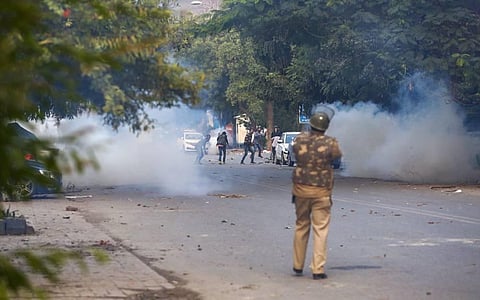

Despite truckloads of criticism that are heaped on all governments all over the world, they are still looked upon to restore peace and order. In general, they are expected to be fairer than those who are involved in parochial civil or criminal disputes among citizens. Of course, local-level policemen and other overlords can get really nasty if their interests or their oversized egos are hurt. Many also develop vested interests, with or without gratification, and yet, the system creaks along, everywhere. But personal vengeance against the populace as such is not usually a major issue and even trigger-happy encounter specialists carry out surgical strikes against marked targets.
The apparatus of democracy is, however, under grave threat when elected political masters turn upon ordinary citizens who are not in the game of electoral politics. One can always argue with some amount of confidence that once in power, leaders have regularly used governments to fix their political adversaries with the connivance of policemen and bureaucrats. But we are not discussing the free-for-all swordplay among politicians. Our spotlight is on governments that now display (and revel in) undisguised spite against sections of their own people—for dissenting.
Tempting as the proposition may sound, it was not really the current regime that first vitiated politics, though it can certainly take credit for taking person-centric viciousness to unforeseen levels We can, perhaps, trace the injection of vendetta and coarseness into Indian politics to Sanjay Gandhi but his techniques of mangling a liberal democracy were soon ably emulated by those who opposed his brand of rowdy politics. Since then, it has been a story of a steady decline. Prime ministers are supposed to set the narrative and, in the intervening decades, we were lucky to have quite a few gentlemen like Inder Kumar Gujral and Atal Bihari Vajpayee who behaved with utmost grace and magnanimity.
Manmohan Singh and Jaswant Singh personified erudition and refinement, and showed no rancour against those who opposed them. Other leaders like N D Tiwari, Jyoti Basu, N T Rama Rao or S M Krishna also embodied decorum and rose above the brand of politics they often presided over. Political killings entered West Bengal in the late 1960s, but it was Siddhartha Shankar Ray who yoked together lumpen criminal elements and state apparatchiks in the early 1970s to exterminate Naxalites in broad daylight. Kerala also has its tradition of political killings, but if specific leaders have to be pointed out for rampantly using state power to teach their rivals a lesson, one would have to mention some past chief ministers of Tamil Nadu and Uttar Pradesh.
But let us move away from political murders or criminalising political opponents to what troubles us more at present. We refer to the completely unrelenting utilisation of the machinery of constitutional governance by elected leaders, at the Centre and in the states, which is now going on. When a Machiavellian caucus converts a movie star’s suicide into a conspiracy and a titillating drama of love, sex, drugs, money and murder, and roasts its captive victims in public, the other side (also a government) whips up shocking criminal charges and goes on a frenzy. When scores are being settled with public funds and a colluding government machinery, dangerous precedents are set that will destroy whatever is left of fair governance.
This vindictive streak is also evident in many states as well and leaders like Mamata Banerjee have been charged with intolerance and punishing those who oppose them. Even so, her attacks are still confined to her political opponents, who retaliate in equal measure, though her government has occasionally criminalised non-political critics for lampooning her on social media. Other chief ministers do it differently but they have also savaged their foes, both political or non-political. None can, of course, beat the abominable record of Adityanath who instinctively pulverises genuine democratic opposition, while brazenly targeting Muslims in particular.
With the collusion of unprincipled government officials, he brutalises liberals and secular forces and devastates dissent across the board. Several honourable judges have decreed that “dissent is certainly not sedition”, but few have ever stepped forward to bell the cat. And then, at the very top, we have a duo known for the merciless quartering of opponents, who are from the same civil society that they congratulated during the past regime, for resisting corruption and demanding justice for Nirbhaya. They have metamorphosed executive watchdogs into ruthless hyenas and let them loose on whosoever differs with them.
A new epoch in state brutality against civil society arrived when the regime armed itself with arbitrary powers of arrest and detention. The judiciary appears to be unusually indulgent and has not yet found time to decide on either the constitutionality of such draconian laws or on the malevolent manner in which they are administered. The least that democracy and transparency enjoin is that some information is made available in the public domain on why so many respectable senior academics and activists have been imprisoned in the Bhima Koregaon case. The Delhi Police has now literally snowed judges under avalanches of mammoth charge sheets in the Delhi riots case, indicting every dissenter possible—to filibuster the judicial process. While respect for laws is surely desirable, terror and vindictiveness can really never be the cardinal elements of a democracy, however battered. After all, governments are meant to deliver, not demonise.
Jawhar Sircar
Retired civil servant. Former Culture Secretary and ex-CEO, Prasar Bharati
(Tweets @jawharsircar)